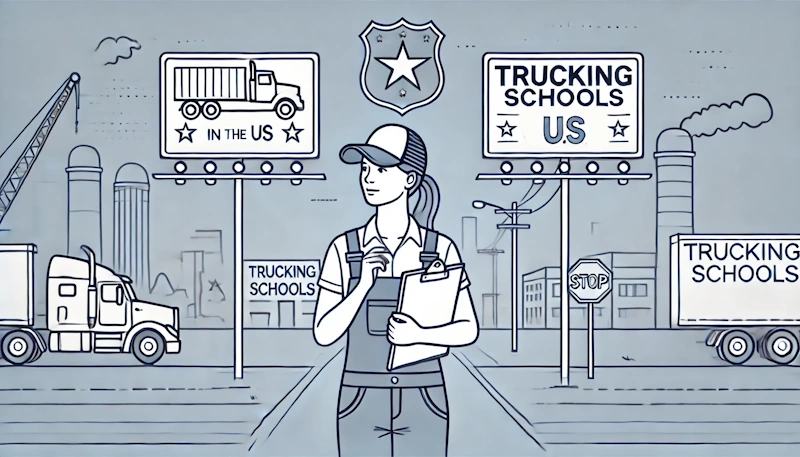Home » Becoming a Truck Driver » Choosing a Truck Driving School
Choosing a Truck Driving School
Choosing a Truck Driving School
Choosing a CDL (Commercial Driver’s License) school is an important step if you’re interested in a career as a professional truck driver.

Here are some key factors to consider when selecting a CDL school:
1. Accreditation and Licensing
- Accreditation: Ensure the school is accredited by a recognized accrediting agency. Accreditation ensures that the school meets certain educational standards.
- Licensing: The school should be licensed by your state’s Department of Motor Vehicles (DMV) or other relevant state agencies.
2. Curriculum and Training Quality
- Classroom Instruction: Look for a curriculum that covers all essential topics, including safety, regulations, and vehicle operation.
- Hands-On Training: The school should offer sufficient behind-the-wheel training, including practice on different types of trucks and driving conditions.
- Hours of Training: Ensure the program includes a balanced mix of classroom hours and practical driving time.
3. Instructor Experience and Qualifications
- Experienced Instructors: Instructors should have significant experience in the trucking industry and hold valid CDL licenses themselves.
- Student-to-Instructor Ratio: Smaller class sizes often allow for more personalized instruction and better learning experiences.
4. Job Placement Assistance
- Job Placement Rate: Research the school’s job placement success rate. A high rate indicates strong industry connections and a good reputation.
- Partnerships with Employers: Schools with established relationships with trucking companies may offer better job placement opportunities.
5. Cost and Financing Options
- Tuition and Fees: Compare the cost of different programs. Be aware of any hidden fees for materials, exams, or additional training.
- Financial Aid: Check if the school offers scholarships, grants, or payment plans. Some schools may also have partnerships with companies that sponsor students in exchange for a work commitment.
6. School Reputation and Reviews
- Reviews and Testimonials: Look for reviews from former students online or ask the school for testimonials. Positive feedback can be a good indicator of quality.
- Graduation and Success Rates: Schools with high graduation and success rates typically provide better training and preparation.
7. Facilities and Equipment
- Modern Equipment: The school should have a fleet of well-maintained, modern trucks and equipment that match industry standards.
- Simulators and Technology: Some schools offer simulators or other advanced technologies for enhanced training.
8. Location and Scheduling
- Proximity: Consider the school’s location relative to where you live. A nearby school can save on commuting time and costs.
- Flexible Scheduling: If you have other commitments, look for schools that offer night classes, weekend classes, or flexible schedules.
9. CDL Exam Preparation
- Test Preparation: The school should prepare you thoroughly for both the written and driving portions of the CDL exam.
- Pass Rate: Inquire about the school’s pass rate for the CDL exam, which reflects the effectiveness of their training program.
10. Endorsement Training
- Additional Endorsements: If you’re interested in specialized trucking (e.g., hazardous materials, doubles/triples), check if the school offers training for these endorsements.
11. Externship Opportunities
- On-the-Job Training: Some schools offer externships with trucking companies, providing real-world experience before you graduate.
12. Class Size and Individual Attention
- Personalized Instruction: Smaller class sizes usually mean more individual attention, which can be crucial for mastering driving skills.
Taking the time to research and evaluate these factors will help you choose a CDL school that aligns with your career goals and learning needs.